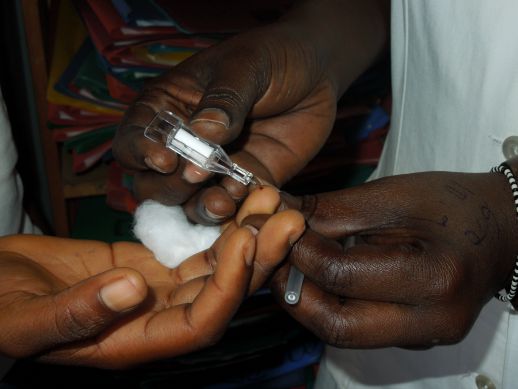Editors’ Note: This summer, six students from Albert Einstein College of Medicine have traveled to Soroti, Uganda, to treat diabetes as part of Einstein’s Global Diabetes Institute (GDI). During this period, we are featuring a series of posts detailing their challenges and progress. In this post, second-year M.D. student Jayson Lian shares his experiences with a GDI diabetes education and prevention effort. The trip was funded by Einstein’s Global Health Fellowship Program.

Photo courtesy of Anneka Wickramanayake
By Jayson Lian
We were heading northeast from Soroti to Ongutoi, Uganda, with our program manager. Our goals were to conduct a diabetes-screening day where we would detect diabetes in a population with limited healthcare access, educate patients about preventive measures and, hopefully, reduce the patient load at Soroti Regional Referral Hospital’s diabetes clinic. The diabetes-screening process consisted of patient surveys, anthropometry, and measurements of blood pressure and blood sugar.
Unforeseen Circumstances
Right away we faced several challenges at the Ongutoi Health Center. As a result of advertising our screening over the radio, we faced an overwhelming number of patients. Furthermore, many of these patients had expectations that did not match our skills. After all, we had finished only our first year of medical school and possessed little more medical knowledge than the average person. We did not anticipate that so many patients would expect to receive diabetes medication and “superior” treatment from the American “doctors.”
It was difficult to explain to patients that we were far from doctors and were not allowed to prescribe medicine. It was even harder to explain that they would have to return to the Ongutoi Health Center another day or make the trip to Soroti if they wanted to receive actual treatment.
Changing Tactics
Largely thanks to Ongutoi Health Center’s administrator, we restructured the screening process midday and began seeing patients at a much quicker rate. The adjustment unfortunately meant there would be less time to educate diabetic patients and build relationships; priority was instead placed on seeing all patients as quickly as possible.
Despite these challenges, we were able to detect new cases of diabetes and encourage a number of patients to seek needed medical help – help they might not have gotten otherwise. By the end of the day, we had seen 250 patients and diagnosed new cases of diabetes.
Lessons Learned
In the long term, I believe we have helped spur the growth of diabetes-screening clinics in Uganda. Despite our initial difficulties, the structure and organization of our trial could be a model for future screenings.
Furthermore, our project promoted diabetes awareness around Ongutoi, and we hope it will help inspire the ministry of health and other diabetes organizations in Uganda to increase funding for diabetes treatment.
Though we could not educate all diabetic patients ourselves, organized village health teams around Ongutoi plan to visit the homes of patients with diabetes and help educate them about diet, medication, and hygiene, using educational materials that we developed.
Changing the culture around diabetes, given its growing foothold in Uganda, requires reform and action. The action would not have been possible without the warm welcome we received from the community, the Ongutoi Health Center staff, and our Global Diabetes Institute program manager.
As a medical student entering my second year, I am proud of what we accomplished that day and am indebted to the hospital employees for their help and collaboration, and to the local community for what they have taught me. I hope to build on this experience and to provide improved medical care to underserved communities like the one in Ongutoi.

